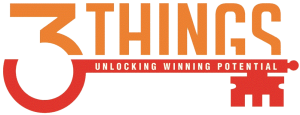The rapid rate of change is creating significant risks and opportunities for sales professionals. We spent six months analyzing assessments of 24,000 salespeople around the world to identify what separates the top 5% from the rest – the factors that are giving them competitive advantage and enabling them to survive and thrive in a rapidly changing ecosystem.
The top 5% excelled in a number of key areas involving ‘professional discipline’ – they were more focused, persistent, and committed to applying rhythms, processes, and tools. Of these, a key attribute that showed up in the best salespeople was effective time management – the top sales professionals scored more than 50% higher in it than the lower performers. But the irony of time management is that it’s not actually about time.
Sure, exceptional salespeople have process, tools, checklists, and to-do lists to help them, but it’s their mindset that makes the difference. Mindset – how you think – isn’t and shouldn’t be fixed. It can be developed with conscious effort over time and specific strategies to change the patterns of thinking that impact the quality of your actions and behaviors.
What to STOP
1. STOP multi-tasking – research at Stanford and the University of London found that people who believed they were brilliant at multi-tasking were actually worse at it, and they’re lowering their IQ! People who multi-tasked during cognitive tasks experienced IQ drops of 15 points, lowering their scores to the average range of an 8-year-old child. I don’t know about you, but I’m not putting an eight year old in charge of major accounts any time soon.
Few people honestly believe they’re better drivers on the road when they’re putting on make-up, talking on their phone, or day-dreaming. While we may get away with being on auto-pilot from time to time, the risk of a crash is significantly greater. In sales, it’s mitigating against the big risk – getting the name or price wrong, missing key information, misinterpreting the brief – that makes the case for focusing on the right thing at the right time and filtering out distractions.
2. STOP putting up with barriers – exceptional performers don’t put up with barriers, they find ways to go around, over, under, or through them. The top 5% of sales professionals have a unique ability to stay committed to tasks and find ways around speed bumps and roadblocks. Rather than lose momentum, they keep moving forward by working out the most effective and efficient way to overcome the barrier or the challenge. Mindset is critical here – as Henry Ford said, “whether you think you can or you can’t, you’re probably right”.
Overcoming barriers through persistence sometimes means taking a step back before moving forward – analyzing the problem and the best strategies to overcome it. The forward momentum may actually seem like a step back, but the objective to overcome the barriers remains and there is consistent thought and action applied to solving the problem over time.
3. STOP avoiding tasks you don’t like – the reality is that life is full of boring crap that needs to get done, exceptional performers just get on with it. The inability to develop good habits to tackle mundane tasks is the Achilles Heel of many sales professionals. Few get inspired by filling in forms and reports when they’d rather be talking to customers, pitching ideas, and negotiating deals. Many limit their competitive advantage and derail their prospects for promotion because they stubbornly refuse to develop a basic level of competence around what they see as ‘box-ticking’ compliance tasks.
A simple example of this is developing good habits around CRM systems like Salesforce. Not developing good habits in using this system is simply cutting off your nose to spite your face. If you needed motivation to do it, consider that most leading companies now use this system, so your marketability as a sales professional relies heavily on showing you are conversant and fluent in this system. Don’t just tick boxes, be a master of it. Avoid it at your peril.
Strategies to STOP
Much like changing any bad habit , it requires awareness around how you think, and commitment to changing your thinking and behaviors. Most former smokers didn’t quit cold turkey, they consciously applied different strategies over time and found what worked for them. Eventually the habit of not smoking takes over.
The more you challenge your thinking around professional disciplines, the more likely you are to change your behaviors. And the more you change your behaviors, the more this will shift your thinking. Developing a flexible and adaptive mindset is critical, and the ability to manage time and prioritize effectively relies on three specific mindset strategies:
1. Concentration – the ability to filter out distraction and focus on the right things at the right time. We live in a world where we’re constantly bombarded by information and requests, as well as a the sense that we need to multi-task to be successful. As salespeople we have to live by the adage that “what interests my customer must fascinate me“, yet we need to give full focus to what’s in front of us and consciously re-direct our attention as priorities dictate.
2. Perseverance – the ability to stay committed to tasks and find ways around speed bumps and roadblocks. Often this starts with a positive and optimistic outlook, especially in times of adversity. As Winston Churchill said: “A pessimist sees the difficulty in every opportunity; an optimist sees the opportunity in every difficulty.” It’s also critical to develop a clear plan to overcome the barriers and stick to it, particularly for longer term goals. To survive and thrive in a complex world, sales professionals need to be clear and passionate about their key objectives and ‘must win battles’, then develop a clear plan to address and overcome obstacles. Anything rewarding is likely to be challenging.
3. Applying ‘Task Value’ – the ability to ‘make it matter’ and get motivated even when the task isn’t engaging or exciting. Most successful executives will tell you that as you rise through the ranks, there is a fair bit of reporting and administrative tasks most people are not passionate about, but need to get done for the business to function. Again, it’s important to remember that life is full of boring crap that needs to get done, exceptional performers just get on with it so they can focus on doing the fun stuff. Like the Salesforce example, determine the tasks that need to get done and find a reason to get motivated. You don’t have to love it, but you might learn to appreciate it… worst case you may help your long-term prospects and success if you just get on with it.
So the research is clear, there is are some simple yet fundamental differences between the habits and disciplines of the top 5% of sales professionals and the rest. To master these disciplines and create competitive advantage, there are some key they can stop doing to stay ahead of the pack.
For more on our findings around the ‘DNA of Exceptional Sales’ – check out our research and insights: http://bit.ly/1QXIRhO


